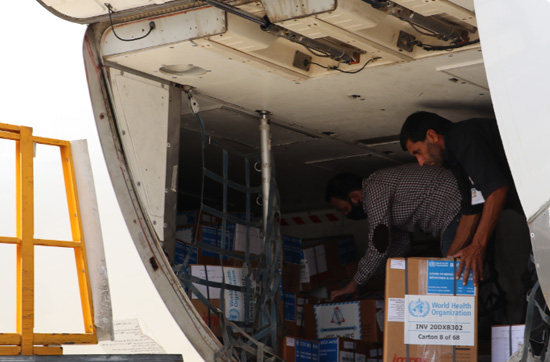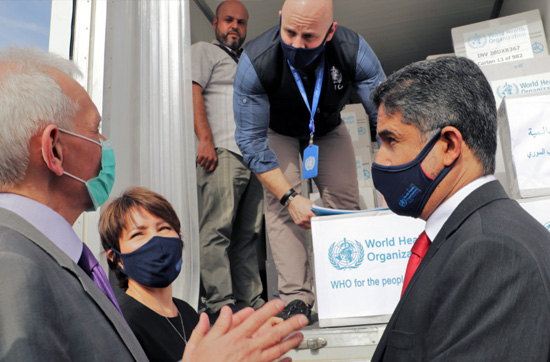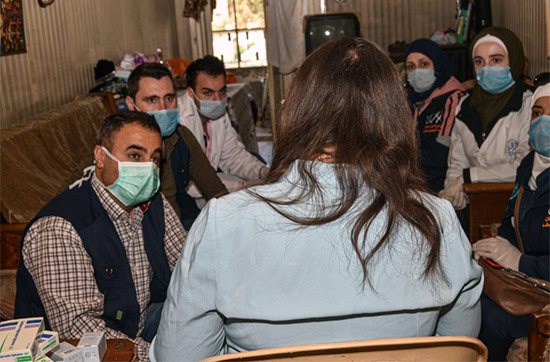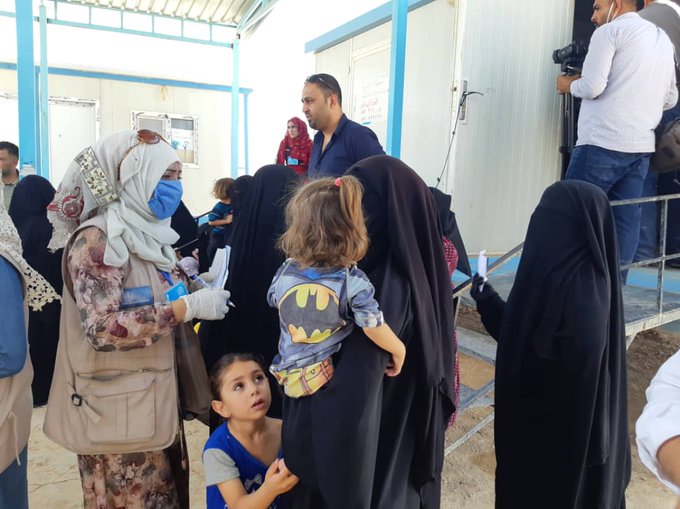WHO Regional Director for the Eastern Mediterranean hands over medical supplies during his visit to Syria
 24 October 2020, Damascus, Syria – A chartered aircraft has landed in Damascus International Airport from the WHO's logistics hub in Dubai, carrying WHO supplies to support the health response in Syria. The 8.8-ton shipment includes medical kits and medicines for almost 2000 beneficiaries and enough personal protective equipment to protect more than 4000 health care workers.
24 October 2020, Damascus, Syria – A chartered aircraft has landed in Damascus International Airport from the WHO's logistics hub in Dubai, carrying WHO supplies to support the health response in Syria. The 8.8-ton shipment includes medical kits and medicines for almost 2000 beneficiaries and enough personal protective equipment to protect more than 4000 health care workers.
“Health care workers are the backbone of any health system, and protecting them is protection for us all,” said Dr Al-Mandhari, WHO Regional Director for the Eastern Mediterranean Region, who handed over the supplies to health authorities soon after he arrived in Damascus today for a five-day mission.
“These supplies will strengthen the health sector’s response against COVID-19 across Syria. One of our main priorities is to take measures to maintain the safety of all medical staff and front-liners in health facilities who are sparing no effort to respond to this pandemic despite the challenges on the ground,” Dr Al-Mandhari added.
 The humanitarian shipment arrives at a critical time, when Syria, like many countries in the Region, is expecting a surge in the number of COVID-19 cases. As part of preparedness and response, WHO is working closely with all partners to strengthen surveillance, enhance testing and laboratory capacity, support health services, and ensure the delivery of life-saving medicine and equipment.
The humanitarian shipment arrives at a critical time, when Syria, like many countries in the Region, is expecting a surge in the number of COVID-19 cases. As part of preparedness and response, WHO is working closely with all partners to strengthen surveillance, enhance testing and laboratory capacity, support health services, and ensure the delivery of life-saving medicine and equipment.
As a result of the 10-year conflict and its impact on the national health system, WHO classifies Syria among high-risk countries in the Region, due to devastated health infrastructure and limited availability of health care services. International sanctions further hinder Syria’s national capacity to cope with the COVID-19 pandemic, causing an unprecedented socioeconomic burden on the Syrian people.
WHO-supported mobile teams deliver mental health care in Syria
 14 October 2020, Syrian Arab Republic – Amid the COVID-19 pandemic, movement restrictions and lockdowns can have as much of a negative impact on people as the virus transmission itself. Patients needing mental health services are most affected, especially those struggling to access treatment at a health care facility. In Syria, 75% of people with mental health conditions receive no treatment at all, and the current pandemic is further aggravating the situation.
14 October 2020, Syrian Arab Republic – Amid the COVID-19 pandemic, movement restrictions and lockdowns can have as much of a negative impact on people as the virus transmission itself. Patients needing mental health services are most affected, especially those struggling to access treatment at a health care facility. In Syria, 75% of people with mental health conditions receive no treatment at all, and the current pandemic is further aggravating the situation.
“There is no health without mental health. We live in an environment where mental health needs are greater than any other place. WHO works with health partners across the whole of Syria to ensure the medicines and health services for mental health patients are available, while reducing their risk of exposure to COVID-19,” said Dr Akjemal Magtymova, WHO Representative in the Syrian Arab Republic.
WHO-supported mobile teams in Aleppo provide home visits to mental health patients
“My mother, sister and two brothers suffer from schizophrenia. In addition, my 9-year-old younger brother is always in seclusion,” said 30-year-old Kawthar.
“During the COVID-19 lockdown earlier this year, there was no public transportation, and I couldn’t get to the hospital, which is quite far, to buy medicines. As a result, their symptoms started worsening; they started hallucinating, their speech was largely disorganized, and they started having bizarre visions,” she added.
To help thousands of people like Kawthar’s family, WHO continues to support health partners to ensure that medicines and health services for mental health patients are available. To reduce the risk of exposure to COVID-19, patients who used to visit the WHO-supported Mental Health Hospital are now visited at home by mobile teams.
Supported by WHO, the mobile health teams serve more than 1500 people in different areas across Aleppo with a wide range of health services such as nursing, mental health and psychosocial sessions, and COVID-19 awareness sessions. They also provide treatment as needed.
Scaling up mental health services in northwest Syria
“Mental health is of particular importance in northwest Syria, where a fragile context has placed additional stress on a vulnerable population who have been living in a dire situation for the last 10 years,” said Dr Mahmoud Daher, head of the WHO Emergency Field Programme in Gaziantep, Turkey.
Where initially there were only 4 psychiatrists serving a population of over 4 million in 2016, WHO has significantly scaled up the training of over 160 doctors and nearly 450 psychosocial workers to provide non-specialized mental health and psychosocial support services in primary health care centres across northwest Syria. Over 20 local organizations inside northwest Syria are operating over 160 facilities to provide mental health care and psychosocial services to 71 communities and 29 sub-districts across the region.
To respond to COVID-19, WHO has partnered with a local nongovernmental organization to implement mental health and psychosocial COVID-19 helplines to support frontline workers, patients, and their respective families to understand and cope with the pressures of the pandemic. Three hotlines are currently active to support individuals across northwest Syria and in southern Turkey.
Syrians take steps in journey of acceptance of mental health needs
Despite the stigma that continues to prove a barrier for patients in accessing mental health care, health partners are noticing an improvement in behaviour change among Syrians, with individuals becoming more self-aware and seeking help when they experience symptoms immediately, instead of waiting until their condition is critical.
Ms Ola Alshab, a psychosocial worker with a WHO implementing partner, provides mental health services to communities living in Idleb.
“Mental health is important. We live in a society that has been affected by war and generally has a lack of understanding regarding mental health and psychosocial needs,” she says.
Despite the still-existing stigma, Ms Alshab has noticed an improvement.
“People have become more accepting of mental health and psychosocial services. When they see the list of symptoms that characterize basic mental health conditions, they can relate to them and ask for help. When they see that a member of their family is benefiting from care, it makes a difference.”
WHO declares first COVID-19 case among residents in Syria’s Al Hol camp
Damascus: August 27, 2020 – WHO confirmed today the first COVID-19 case among residents in Syria’s Al Hol camp. The female patient is 29 years old and in stable condition. She is being treated in an isolation area in Phase 7 of the camp, where a national NGO, in partnership with WHO, is providing case management support.
Health workers have already begun contact tracing and will be monitoring all close contacts for COVID-19 symptoms. WHO is collaborating with camp authorities and partners to engage communities, reinforcing messages about measures that they can take to protect themselves.
A lockdown will also be imposed in Phase 7 for the next 14 days.
WHO continues to monitor the situation in Al Hol camp and has mobilized 6 mobile teams in 6 locations to scale up health activities in the camp. We have also established sub-committees that look into all aspects of COVID-19 response and will meet daily to monitor the situation and provide the appropriate technical support to health partners.
For further information, please contact:
Dr Akjemal Magtymova
WHO Representative, Syria
WHO calls for unhindered humanitarian access to all Syrians and support for health system resilience
Within the context of the Brussels conference on Syria, WHO emphasizes that health is a human right that must be respected by all parties to the conflict, that attacks on health workers and facilities must stop, and that there must be adequate investments in the health sector
 30 June 2020 – As the crisis in Syria enters its tenth year, WHO calls on parties to the conflict and the international donor community to put the health and well-being of the Syrian people first. Sustained access via all modalities and sufficient resources are required to enable WHO and partners to meet the health needs of all people across the country.
30 June 2020 – As the crisis in Syria enters its tenth year, WHO calls on parties to the conflict and the international donor community to put the health and well-being of the Syrian people first. Sustained access via all modalities and sufficient resources are required to enable WHO and partners to meet the health needs of all people across the country.
Syrians who survived a decade of war are now facing an unprecedented socioeconomic crisis and a potentially disastrous COVID-19 pandemic, in addition to other public health risks. More than 12 million people in Syria are in need of humanitarian aid, including over 6 million internally displaced people living in camps or in camp-like settlements.
Although there are relatively few cases of COVID-19 across the country – 269 cases as of June 30 – official figures likely represent a significant underestimate of the true number. Syria is at risk of a substantial acceleration of the outbreak, due to its weakened health system and the difficulties in applying “lockdown” measures in the context of an economic crisis. Nonetheless, there is still an opportunity to prevent and mitigate the impact of the outbreak, by further expanding preparedness and response measures, especially at subnational level.
Displaced Syrians, particularly in the northeast and northwest of the country, live under conditions making them particularly vulnerable to respiratory infections such as COVID-19. Many live in overcrowded living conditions, and also face physical and mental stress and deprivation due to lack of housing, food and clean water. The humanitarian situation in northwest Syria remains one of the most acute and severe in the world with over 2.8 million people dependent on humanitarian assistance supplied almost entirely via cross-border operations from southern Turkey.
Across the country, deteriorating conditions continue to place significant stress on the Syrian population, including increased prevalence of chronic diseases and mental health conditions, and increased rates of malnutrition. Many people live below the poverty line, further increasing their health needs and risks. But it is challenging to meet the health needs of Syrians – especially the most vulnerable – when less than half of health facilities are fully functional and there are such major shortages of health care workers. Health workers are describing an immense strain on services with only the most urgent cases being treated.
Attacks on health care continue, and the risk of ongoing ceasefire violations are of great concern in the northwestern part of the country. This year alone, 16 attacks on health care have been reported, in which 10 people died and 36 were injured, including 6 health care workers.
WHO continues its lifesaving work with partners inside Syria and cross-border from Turkey to respond to urgent health needs, and repeats calls by the United Nations for an immediate ceasefire, easing of sanctions that impede the COVID-19 response, and for a political solution to the conflict, along with the increased investments in health and health system resilience to protect the lives of millions of vulnerable men, women and children. The people of Syria cannot have a future without proper health care.


